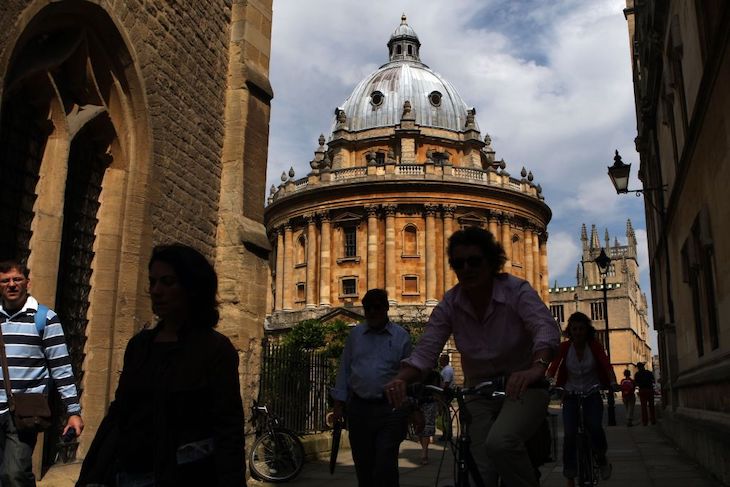What’s the quickest way to make the two most famous universities in the world go wrong? Make it easier to get in. That’s exactly what Oxford and Cambridge appear to have done in recent years. And so – no surprise – it’s just been announced that neither university was in the top three British universities for the first time since the records, produced by the Times, began 32 years ago.
Oxford’s slipping standards don’t just apply to those trying to win a place
This decline must at least partly be blamed on the universities offering ‘contextual offers’ or using ‘contextual data’ in assessing applicants who may have lower grades. It appears to be under this flawed system that the president-elect of the Oxford Union, George Abaraonye, got into Oxford with just ABB in his A-Levels. He’s the one who disgracefully gloated at the death of Charlie Kirk this month, with the semi-literate Instagram post “Charlie Kirk got shot loool.”
Oxford’s slipping standards don’t just apply to those trying to win a place, but also to those graduating. In 1993, when I sat my Finals, just over 16.34 per cent got Firsts. In 2021, it was 36 per cent.
Have undergraduates got more than twice as clever in the last 30 years? Of course not. In fact, their degrees are much easier. Classics Mods – the second-year exam – were once held up as the second hardest exams in the world, after the Chinese Civil Service exams. When I sat them in 1991, you had to read eight books of Virgil’s Aeneid in Latin and 24 books of Homer’s Iliad or Odyssey in Greek.
Now, because of the collapse of the rigorous study of classics in most schools in Britain, the course has been dumbed down to avoid a similar decline in exam results.
The embarrassing thing for the authorities is that the last places where subjects like classics are taught at the highest level are independent schools and grammar schools. Very few comprehensives offer Greek for A Level at all. So, if you kept the old entrance requirements, in classics you’d likely be left with the awkward situation that those who have been selectively educated will do that much better than those who haven’t. The government, of course, is unlikely to be happy about that outcome. The answer? Make it easier to get in. Dumb down the syllabus. Inflate the finals grades.
One of the fringe benefits of the decline of Oxbridge is the rise of other universities. Very bright pupils – who got much better A-Level results than George Abaraonye – did not get into Oxbridge. So they headed for other universities, whose performance has, in turn, improved.
Of course, there still remain extremely clever undergraduates at Oxbridge from all backgrounds, who work extremely hard. But their Firsts will be that much harder to pick out among the inflated crowd of people who get the top mark.
The answer is not to dumb down the universities but to improve the schools of those who’ve been given the contextual offers. The perfect situation is to have a level playing field when pupils apply to Oxbridge, not to put obstacles in the place of those who’ve had the misfortune to be well-educated.
Oxford and Cambridge degrees don’t last long enough – and the teaching hours aren’t extensive enough – to remedy the unfair gaps caused by a bad school education.
If you do a three-year course at Oxford, you have nine terms, each of eight weeks. In many courses, you will only have a single one-hour tutorial a week. So that’s 72 hours of teaching – three days of the fabled one-on-one tutorials.
You top that up with lectures and your own study. But, still: that’s a drop in the ocean compared to the time you spend working at school. There are 13 years of primary and secondary school education, plus nursery school on top. You’ll spend around 39 weeks a year at school, having dozens of hours of tuition every week.
So how can the unfairly deprived pupil ever catch up with the fortunate, well-educated one? Unless they’re superhuman, they won’t do it in three or four years of higher education.
I did intensive Latin from the age of nine; intensive Greek from the age of ten. So I’d done eight or nine years of language-learning by the time I got to Oxford. How could someone, starting from scratch at 18, catch up – not least because lucky people like me go on working while they’re at university. It’s not like the well-educated give up at university, and wait for their unluckier contemporaries to catch up.
The idea of a brilliant university is very simple to define, if hard to achieve. Accept the cleverest 18-year-olds with the best marks. Teach them the best that has been thought, or said, for three or four years. Set them extremely difficult final exams, in which only a small fraction get the top mark.
Oxford and Cambridge stopped doing this. They slipped down the league tables. QED.







Comments